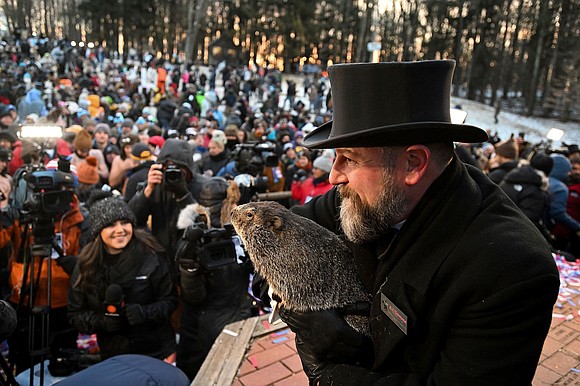What did the groundhog see? Punxsutawney Phil’s winter predictions are in
Mary Gilbert, CNN Meteorologist | 2/2/2024, 12:52 p.m.

Punxsutawney Phil – the famous groundhog weather watcher – woke up and did not see his shadow Friday morning, calling for an early spring.
Each February 2, on Groundhog Day, the members of the Punxsutawney Groundhog Club make the pilgrimage to Gobbler’s Knob – Phil’s official home.
The group waits for Phil to leave his burrow and (legend has it) if he sees his shadow, six more weeks of winter are on the way. If he doesn’t, an early spring arrives.
Phil and his friends in Punxsutawney, Pennsylvania, have been predicting the seasons since 1887, according to the Punxsutawney Groundhog Club.
Scientifically speaking, winter will end on the spring equinox on March 19 at 11:06 p.m. ET, regardless of today’s prediction. But Mother Nature doesn’t always follow the timetable, and neither does Phil.
On average, Phil’s prognostications have hit the mark just under 40% of the time since 2013, according to NOAA’s National Centers for Environmental Information. For a track record with worse odds than a coin flip, putting stock in Phil’s forecasts may not be a great bet.
There are experts who have what Phil lacks.
Meteorologists at the National Weather Service’s Climate Prediction Center produce forecasts for temperatures and precipitation across the US on timescales ranging from 1 to 2 weeks to more than a full year in the future.
The center’s latest outlook for February calls for above-average temperatures across a huge part of the US, a trend forecast to continue into spring across the northern US.
While these potentially warmer conditions could be interpreted as an early spring, it’s more indicative of a winter that largely hasn’t lived up to the name.
Every state in the northern half of the US experienced one of the warmest Decembers on record this winter, seven of which were record-warm. Despite a brutal cold mid-month with two powerful blizzards, January still began and ended with above-average temperatures for much of the region.
Warmer winters aren’t a fluke. Winter has become the fastest-warming season for nearly 75% of the US as temperatures rise globally because of human-caused climate change.
Given that, will Phil’s prediction of an early spring come true? To quote the Magic 8 Ball, a popular fortune-telling toy with similar scientific clout to the beloved groundhog: “Signs point to yes.”




